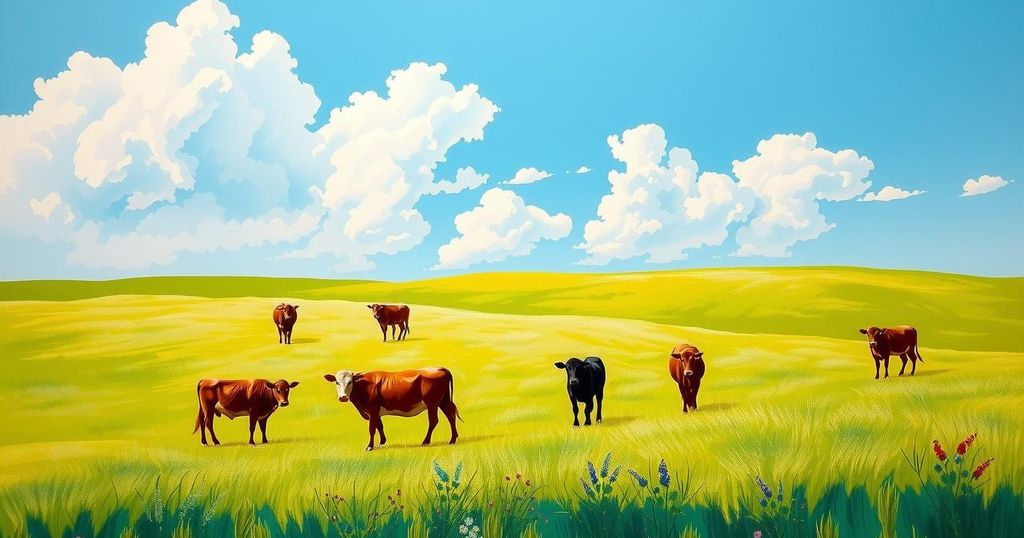Resurgence of New World Screwworm Poses Threat to Livestock and Humans

The New World Screwworm fly is threatening American livestock again after an outbreak in Mexico. USDA Secretary Brooke Rollins announced a ban on live cattle, horse, and bison imports from the southern border. The flies pose serious health risks to both animals and humans, and past outbreaks caused significant losses in the livestock industry.
The New World Screwworm (NWS) fly, once considered eradicated in the U.S. since 1966, is re-emerging as a serious concern for American livestock. Following a recent outbreak in Mexico, U.S. Department of Agriculture (USDA) Secretary Brooke Rollins announced a ban on imports of live cattle, horses, and bison from the southern border. This precautionary measure came via a post on X (formerly Twitter) over the weekend, emphasizing the urgency of the situation.
Rollins stated, “Due to the threat of New World Screwworm, I am announcing the suspension of live cattle, horse, and bison imports through U.S. southern border ports of entry effective immediately.” The consequences of a resurgence could be dire; historically, it took three decades for the cattle industry to recover after the last infestation.
The NWS is primarily found in places like Cuba, Haiti, the Dominican Republic, and some South American countries, as noted by the USDA’s Animal and Plant Health Inspection Service (APHIS). While these flies typically reside in wooded areas, they often target warm-blooded hosts, especially livestock, in open pastures. Females lay their eggs in open wounds or natural orifices, leading to the emergence of larvae that can inflict severe flesh damage.
The larvae, also called maggots, are notorious for their invasive feeding behavior, resembling the action of a screw boring into wood, hence the name. “Maggots cause extensive damage by tearing at the hosts’ tissue with sharp mouth hooks,” warned APHIS, which can further entice more flies to lay eggs in the damaged area.
Infestation is mostly painful and can lead to a serious condition called myiasis, where fly larvae thrive in human tissue. The Centers for Disease Control and Prevention (CDC) points out that although rare, instances of human infestations can occur too. Travelers returning from South America or the Caribbean, especially those sleeping outdoors or who have open wounds, are particularly vulnerable.
According to the CDC, “Wounds as small as a tick bite may attract a female to feed,” highlighting the need for vigilance among at-risk populations. Immunocompromised individuals and the very young or old are at greater risk. Recent surgical patients should also take precaution, as open sores attract the flies keenly.
The implications of another NWS outbreak in the U.S. could be catastrophic. As the USDA noted, pets, livestock, wildlife, and even humans could fall victim to screwworm myiasis. During the 1950s and 1960s, livestock producers were estimated to lose between $50 million and $100 million annually to NWS before its successful eradication.
These losses once were attributed to the high density of livestock populations in the Southwest, where environmental factors allowed for NWS to overwinter. Although the USDA successfully wiped out NWS in 1966, a small outbreak in the Florida Keys in 2016 targeted an endangered deer population but was eradicated by March 2017. It’s a stark reminder of the past, and the need to remain vigilant against such threats is clear.
The re-emergence of the New World Screwworm poses a significant threat to livestock and human health in the United States. With a history of devastating impacts and a recent outbreak in Mexico, immediate import bans have been enacted to prevent similar situations from occurring again. Continuous vigilance is needed to avoid the detrimental effects observed in previous decades, as populations of livestock and vulnerable individuals face real risks of infestation.
Original Source: www.foxnews.com







